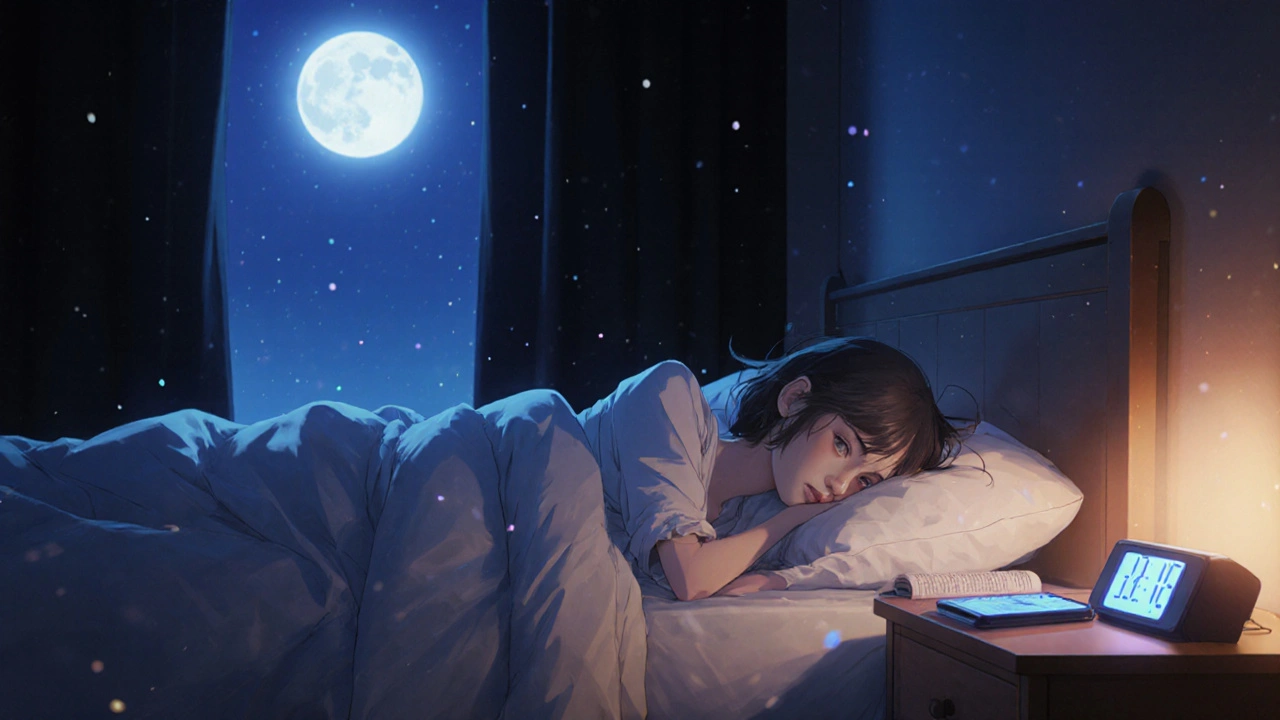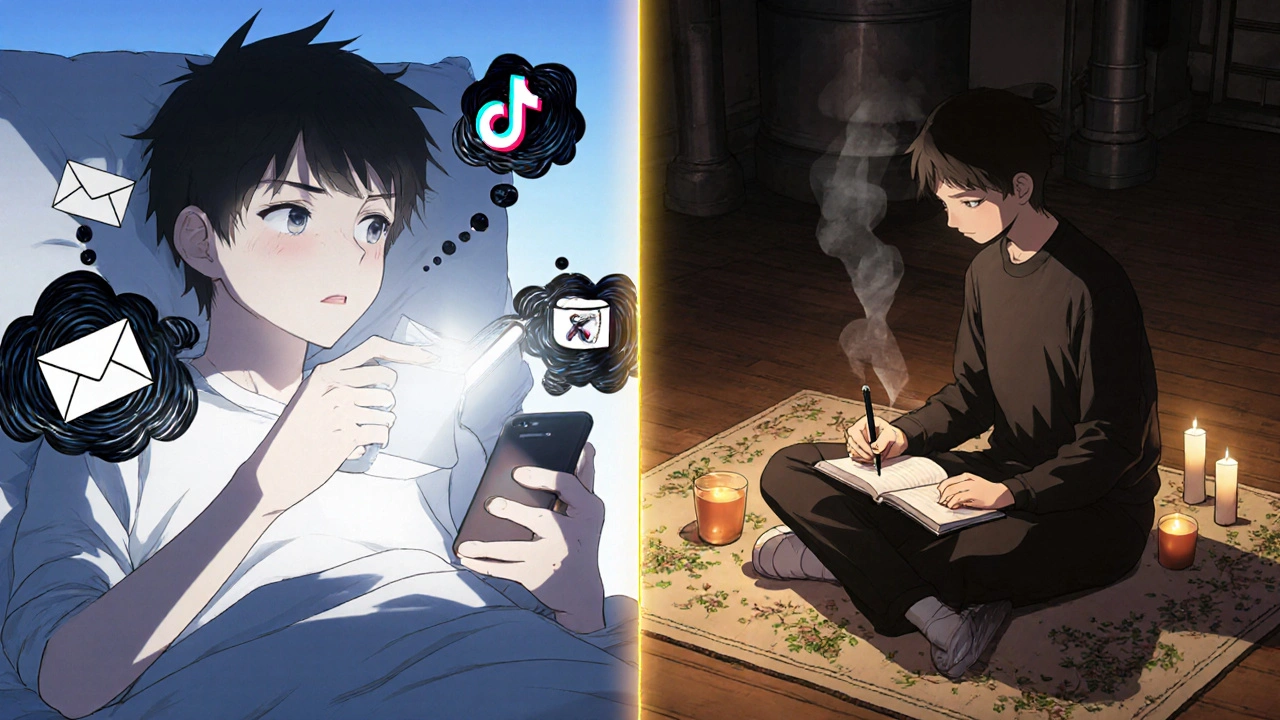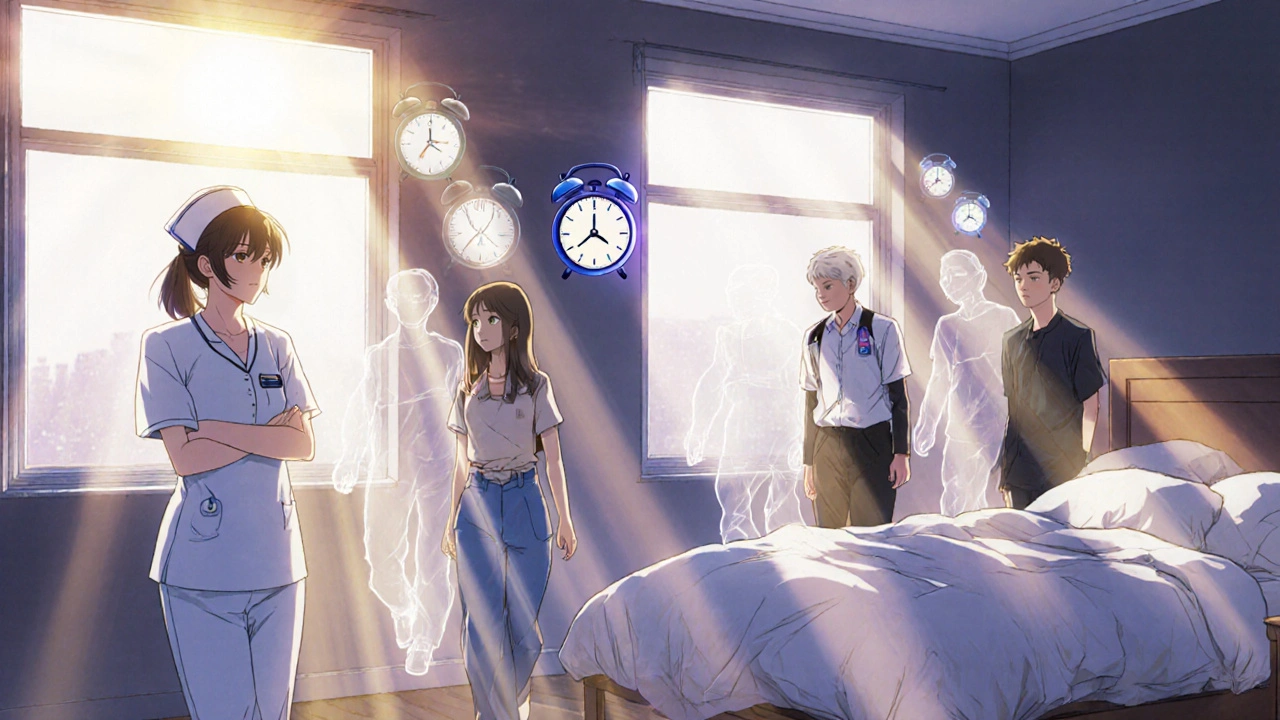Sleep Hygiene: Simple Behavioral Changes to Improve Sleep Quality

Most people think poor sleep is just about lying awake at night. But the real issue? What you do during the day - and how you treat your bedtime like an afterthought. If you’re tired every morning, reach for coffee before noon, or wake up feeling like you never really slept, it’s not just stress or aging. It’s likely your sleep hygiene.
What Sleep Hygiene Really Means
Sleep hygiene isn’t about fancy pillows or expensive sleep trackers. It’s a set of daily habits that tell your body when it’s time to wind down and when it’s time to wake up. These aren’t suggestions from a wellness blog - they’re backed by decades of research from the American Academy of Sleep Medicine and studies published in journals like Sleep and Frontiers in Psychology.The goal? Train your brain and body to associate your bed with sleep - not scrolling, worrying, or binge-watching shows. And it works. A 2023 review found that people who stick to basic sleep hygiene practices cut their insomnia symptoms by 30-40%. That’s not magic. That’s biology.
The Four Pillars of Effective Sleep Hygiene
Not all advice is created equal. Some tips you’ve heard - like avoiding exercise before bed - are outdated. Others, like keeping a consistent wake time, are non-negotiable. Here are the four behaviors that actually move the needle, based on data from over 10,000 participants across multiple studies:- Wake up at the same time every day - even on weekends. This is the single most powerful habit. Your body runs on a clock. If you sleep in until noon on Saturday, you’re resetting that clock. Studies show consistent wake times reduce how long it takes to fall asleep by up to 70%. One user on Reddit reported cutting their sleep onset from 90 minutes to 25 minutes just by waking at 6:30 AM daily.
- Control your bedroom environment. The ideal temperature? Between 60-67°F (15.6-19.4°C). Too warm? Your body can’t drop its core temperature to trigger sleep. Keep lights below 5 lux at night - that’s dimmer than a nightlight. Blackout curtains, eye masks, and white noise machines aren’t luxuries. They’re tools.
- Stop caffeine after 2 PM. Caffeine has a half-life of 5-6 hours. That afternoon coffee? It’s still in your system at midnight. A 2023 study found that people who cut caffeine after 2 PM fell asleep 30 minutes faster on average. Same goes for alcohol - it might make you drowsy, but it shreds your deep sleep.
- Wind down mentally for 60 minutes before bed. If your brain is replaying work emails or scrolling through TikTok, it won’t shut off. Try reading a physical book, journaling, or doing light stretching. Avoid screens. Not because of blue light - that’s overhyped - but because content stimulates your mind. Your brain needs to transition from “doing” to “being.”
What Doesn’t Work (And Why You’re Wasting Time)
There’s a lot of noise out there. You’ve probably heard:- “Don’t eat after 7 PM.” - Not true. Going to bed hungry can hurt sleep for some people. A light snack (like a banana or a few almonds) is fine if you’re actually hungry.
- “No exercise after 6 PM.” - False. A 2023 study from the University of Tsukuba found that 68% of people slept better after evening workouts. Just don’t do intense cardio right before bed.
- “Use blue light filters.” - They help a little, but not much. The Sleep Foundation’s 2024 meta-analysis found blue light filters only reduce sleep onset by 4-7 minutes. Your wake time matters more.
- “Take melatonin every night.” - It’s not a sleep pill. It’s a time signal. Only use it if you’re jet-lagged or have a delayed sleep phase. Long-term use without medical guidance can mess with your natural rhythm.
Focus on what the science says works. Skip the rest.

Why Consistency Beats Perfection
You don’t need to nail every rule. You just need to stick to the big three: consistent wake time, no caffeine late in the day, and a screen-free wind-down. A 2022 study of Canadian university students found that those who did five or more of the evidence-based habits dropped their sleep quality score from “clinically poor” to “normal” - just by making small, steady changes.The problem? People try to overhaul everything at once. Then they quit. Instead, pick one habit. Master it for two weeks. Then add another. Habit stacking helps: “After I brush my teeth, I’ll turn off my phone and read for 20 minutes.” That’s easier than “I need to sleep better.”
And don’t beat yourself up if you miss a night. Sleep hygiene isn’t about being perfect. It’s about building a reliable pattern over time. The brain learns through repetition, not willpower.
What to Do If It’s Not Working
If you’ve tried the basics for 3-4 weeks and still can’t sleep, you’re not failing. You might need more than hygiene.Chronic insomnia - where you struggle to sleep three or more nights a week for months - needs more than habits. It needs cognitive behavioral therapy for insomnia (CBT-I). CBT-I combines sleep hygiene with techniques to rewire anxious thoughts about sleep. Studies show it’s twice as effective as sleep hygiene alone.
And if you’re relying on sleep meds like melatonin, diphenhydramine, or prescription pills, you’re risking dependence. The FDA says 30% of users become dependent after eight weeks. Sleep hygiene is the foundation. CBT-I is the upgrade.
Real People, Real Results
A 2023 Harvard Health survey of 2,145 adults found that 67% of people who stuck with sleep hygiene cut their use of over-the-counter sleep aids. Another 83% said they felt more alert during the day.One user in Halifax, a nurse working night shifts, started waking at 7 AM every day - even after her 11 PM to 7 AM shift. She stopped checking her phone after 9 PM and bought blackout curtains. Within three weeks, she stopped waking up at 3 AM. “I didn’t feel like I was always catching up on sleep,” she said. “I just… slept.”
Another student, tired of napping all day, started setting a fixed 11 PM bedtime and 7 AM wake-up. She used a free app to track it. After a month, her grades improved. She stopped drinking energy drinks. She didn’t change her major. She just changed her routine.

Tools That Actually Help
You don’t need a fancy device. But if you want help staying consistent, these tools have proven results:- Sleep Cycle - Tracks sleep patterns and wakes you during light sleep. 4.7/5 rating, over 1.2 million reviews.
- ShutEye - Monitors sleep and gives personalized tips. 4.5/5 on Google Play.
- Free sleep diary - Write down your bedtime, wake time, caffeine intake, and how you felt the next day. Do this for 7-10 days. You’ll spot patterns you never noticed.
Apps aren’t magic. But they help you see progress. And seeing progress keeps you going.
Who Struggles the Most - And Why
Not everyone has the same barriers. Students, especially in engineering, average 6.2 hours of sleep. Arts students get 7.5. Why? It’s not laziness. It’s schedule rigidity. Shift workers, caregivers, and low-income households often can’t control their environment - noisy apartments, shared rooms, no AC. A 2023 Lancet study found only 19% of low-income people could keep their bedroom cool enough for good sleep, compared to 87% of high-income households.That’s not a personal failure. It’s a system issue. But even small changes - like using a fan, wearing socks to bed, or blocking light with towels - can help.
The Bigger Picture
Sleep isn’t a luxury. It’s a biological need. The World Health Organization says better sleep hygiene could reduce global insomnia by 15-20% - saving $120 billion in healthcare costs. Employers are catching on: 68% of Fortune 500 companies now include sleep hygiene in wellness programs.But it starts with you. Not tomorrow. Not next week. Today. Pick one thing. Do it for 14 days. See what changes.
You don’t need to fix everything. Just fix one thing - and keep doing it.
Can sleep hygiene cure insomnia?
Sleep hygiene alone won’t cure chronic insomnia - that’s when you struggle to sleep three or more nights a week for months. It’s a strong foundation, but if you’ve tried it for 3-4 weeks with no results, you likely need cognitive behavioral therapy for insomnia (CBT-I). CBT-I combines sleep hygiene with techniques to stop worrying about sleep, which is often the real blocker.
Is it okay to nap during the day?
Short naps (20-30 minutes) before 3 PM are usually fine and won’t hurt nighttime sleep. But longer or later naps - especially after 4 PM - can make it harder to fall asleep at night. If you’re struggling to sleep, try skipping naps for a week. You might be surprised how much it helps.
How long until I see results from better sleep hygiene?
Most people notice small improvements in 7-10 days - like falling asleep faster or waking less often. But real, lasting changes take 14-21 days of consistent practice. Your body needs time to reset its internal clock. Don’t give up if you don’t feel better right away.
Should I avoid screens before bed?
Yes - but not because of blue light. The real issue is mental stimulation. Scrolling through social media, checking emails, or watching intense shows keeps your brain active. Even if you use a blue light filter, your mind is still racing. Try reading a book, listening to calm music, or journaling instead. That’s what actually helps you wind down.
Is it bad to go to bed hungry or full?
Neither extreme is ideal. Going to bed starving can keep you awake. Eating a heavy meal right before bed can cause discomfort or heartburn. The sweet spot? A light snack - like a banana, yogurt, or a handful of nuts - about an hour before bed if you’re truly hungry. Avoid large, greasy, or spicy meals within 3 hours of sleep.
Does exercise before bed ruin sleep?
No - not for most people. A 2023 study found that 68% of participants slept better after evening workouts. The old advice to avoid exercise after 6 PM is outdated. Just don’t do intense cardio right before bed. Light yoga, stretching, or a walk is fine and can actually help you relax.
Can I use melatonin every night?
Melatonin isn’t a sleeping pill. It’s a signal that tells your body it’s time for sleep. It’s most useful for jet lag or delayed sleep phase. Using it nightly long-term can reduce your body’s natural production. Only use it occasionally, and only if you’ve tried sleep hygiene first. Talk to a doctor if you’re thinking about regular use.
Kihya Beitz
November 14, 2025 AT 11:39Wow, another ‘just wake up at the same time’ guru. Cool. I’ve been waking at 6:30 AM for 12 years. Still wake up feeling like a zombie who lost a fight with a mattress. Wake time doesn’t fix your 3 a.m. anxiety spiral when your brain’s replaying that email you sent in 2019. 🤡
Jennifer Walton
November 14, 2025 AT 22:42The body has a clock. But the mind? It’s a hurricane in a sock drawer.
Jonathan Dobey
November 15, 2025 AT 06:35You’re all missing the real elephant in the room: sleep hygiene is a neoliberal distraction. The system doesn’t care if you sleep well - it wants you exhausted enough to consume, but not enough to revolt. Your ‘blackout curtains’? A Band-Aid on a gunshot wound. The real enemy is the 24/7 capitalist grind that turns your circadian rhythm into a corporate KPI. I sleep at 4 a.m. because my job requires me to be ‘available.’ Your ‘consistency’ is a luxury only the rentier class can afford. 🌑
ASHISH TURAN
November 15, 2025 AT 20:29I work night shifts in Mumbai. My room is 30 sq ft, no AC, and my neighbor’s dog barks at 2 a.m. I can’t control the temperature or the noise. But I do wear socks to bed and use a towel over the window. It’s not perfect. But it’s mine. Thanks for acknowledging that not everyone has the same privileges. 🙏
Ryan Airey
November 16, 2025 AT 20:21Stop pretending this is science. You cite ‘studies’ like they’re gospel, but half your ‘evidence’ is from Reddit anecdotes and Harvard surveys with 2,145 people. That’s not a sample size - it’s a tweet. And you say caffeine’s half-life is 5–6 hours? Try 10 hours for slow metabolizers. You’re giving people false hope. Wake time? Maybe. But your entire post is cherry-picked fluff wrapped in a lab coat.
Hollis Hollywood
November 18, 2025 AT 08:47I just want to say - I really relate to the part about mental wind-down. I used to lie there scrolling through TikTok for an hour, thinking I was relaxing, but my brain was just screaming in 15-second clips. Then I started reading actual paper books - like, physical books, with pages - and I swear, it’s like my nervous system finally remembered how to exhale. It’s not about the light. It’s about the noise. The mental noise. And it took me months to realize I wasn’t tired from lack of sleep… I was tired from being constantly on. I still mess up sometimes. But now I forgive myself. That’s the real secret, I think. Not the schedule. The kindness.
Aidan McCord-Amasis
November 20, 2025 AT 04:35Blue light filters = scam. 😴
Adam Dille
November 21, 2025 AT 10:10Hey @3918 - I feel you. I used to buy all those blue-light glasses too. Then I just turned my phone to grayscale at 9 p.m. and it changed everything. No more doomscrolling. Just… quiet. And yeah, it’s weirdly satisfying. 🌙
Katie Baker
November 23, 2025 AT 05:18My mom said the same thing: ‘Pick one thing. Just one.’ So I started turning off my phone at 10:30 p.m. No more late-night texts. No more ‘just one more video.’ I didn’t change anything else. Just that. And now? I’m falling asleep faster than I have in years. It’s not magic. It’s just… stopping. And that’s enough. 💛